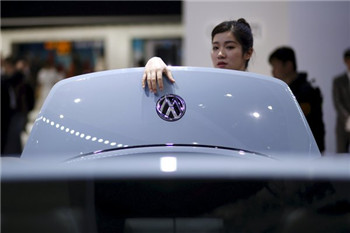(单词翻译:单击)

HONG KONG — China is Volkswagen’s single-largest market, and the company vies with General Motors as the country’s biggest automaker. But Volkswagen’s diesel scandal is unlikely to have many repercussions in China.
香港——中国是大众汽车(Volkswagen)的最大市场,此外它还在和通用汽车(General Motors)争夺该国最大汽车制造商的地位。但它的柴油丑闻可能不会在这里产生太大影响。
That is because Volkswagen sells almost no diesel cars in China — fewer than 1,000 of the three million or so the company sells each year in the country, where gasoline engines reign.
这是因为大众在中国销售的车型中几乎没有柴油车——公司每年在中国销售300万辆车,其中不到1000辆是柴油动力;汽油动力汽车是在中国占据绝对优势。
It is not for lack of trying on Volkswagen’s part.
这并不是因为大众没有尝试过销售柴油车。
The company, hoping to replicate its success elsewhere as a diesel leader, lobbied Beijing for the better part of a decade to let it build diesel-powered cars in China. But regulators in China, which imports more than half of its oil, have repeatedly rebuffed those pleas — partly over environmental concerns and partly because the government has preferred to reserve relatively scarce diesel fuel for trucks and farm tractors.
为了把作为柴油动力领先者的成功复制到中国来,大众在北京游说了好几年,希望能在中国生产柴油动力车。但在中国,一半以上的石油都是进口的,大众的恳求在监管部门那里屡屡碰壁——部分是环境问题,部分是因为政府想把相对稀缺的柴油留给卡车和农用拖拉机使用。
As a result, the only diesel-powered cars Volkswagen sells in China are imported from Europe and are sold mainly to taxi fleets.
因此,大众在中国销售的柴油动力车全部都从欧洲进口,主要出售给出租车公司。
The environmental concerns have been raised by Chinese regulators who were in frequent contact with American experts, notably at the International Council on Clean Transportation, a nonprofit research group. The council is the same group that documented the performance shortfalls of Volkswagen diesels in the United States and brought the matter to the Environmental Protection Agency.
中国监管部门对柴油动力车相关的环境问题很关心,他们与美国专家频繁接触,尤其是国际清洁交通委员会(International Council on Clean Transportation)的专家。这是一个非营利性的研究机构,正是他们将大众汽车柴油发动机性能不足的问题记录下来,报告给了美国国家环境保护局(Environmental Protection Agency)。
American researchers have long been more worried than European experts that diesel emissions might be carcinogenic. In addition, diesel exhaust tends to have more particulates than gasoline engine emissions. Particulates are a big health concern in dusty northern China, and they add to the notoriously bad air pollution in Beijing itself.
与欧洲的专家们相比,美国研究人员长期以来更担心的是柴油车排放物致癌的可能性。此外,柴油机废气中的颗粒物通常多于汽油发动机。而在中国北方尘沙天气中,颗粒物是一大健康问题,导致了北京本身就严重的空气污染进一步恶化。
Making matters worse is that, until fairly recently, many Chinese refineries lacked the technology to remove much of the naturally occurring sulfur contaminants when they produced diesel from crude oil. The resulting high pollution when diesel was burned as truck fuel made regulators wary of allowing the nation’s fast-growing car fleet to burn diesel as well.
更糟糕的是,直至最近,中国的很多炼油厂在从原油中提取柴油时,缺少将自然产生的硫污染物除去的技术。结果便是柴油作为卡车燃料燃烧时产生大量污染,导致监管机构不敢轻易让全国增长最快的小汽车也使用柴油。
Another predicament in China for Volkswagen involves Chinese consumers. The car-buying public has long been skeptical of diesels, associating them with tractors and viewing them as unsophisticated. Company executives had long expressed confidence, though, that they could change these perceptions with an energetic advertising and public relations effort — if only they could win permission to mass-produce diesels in China.
在中国,大众面临的另一个困难涉及中国消费者。购车者长期对柴油持怀疑态度,会把它和拖拉机联系起来,认为这种车比较低级。但大众的高管一直表示,只要能获准在中国大量生产柴油车,他们有信心通过有力的广告和公关活动来改变这些观念。
Diesels have long offered a trade off — higher air pollution, even with cleanly refined diesel, but also better fuel economy. Europe is a market that highly prizes fuel economy, with some of the world’s most stringent gas mileage standards. China and the United States have somewhat less stringent mileage standards, although they can still be hard for automakers to meet if they produce a lot of big cars and sport utility vehicles. As a European automaker, Volkswagen developed a lot of expertise in building fuel-efficient diesels and started its Chinese diesel lobbying efforts around 2000.
很长一段时间以来,柴油车一直是一种权衡的产物。它带来的空气污染更严重,哪怕用的是清洁提炼的柴油,但它的燃油效率也更高。欧洲市场高度重视节燃油经济性,部分油效标准是全世界最严格的。中国和美国的油效标准多少没那么严格,但既便如此,对大量生产大型车辆和运动型多功能车的汽车生产商来说,要达到这些标准也还是有困难的。作为一家欧洲汽车生产商,大众积累了大量生产节能柴油车的专业知识,并在2000年前后开始在中国展开游说行动。
Since 2008 or so, though, Volkswagen executives have pushed less hard for Chinese diesels. That may be because they began manufacturing expensive but fuel-efficient models of gasoline engines in China. This enabled the company to meet Chinese fuel-economy standards without needing to resort to diesel engines.
但从2008年左右以来,大众高管在中国推销柴油车的力度减弱了。这可能是因为它们开始在中国生产昂贵但却节能的汽油发动机车辆。这让该公司能够不用求助于柴油发动机便达到中国的节油标准。
And those three million cars a year it sells in China indicate that the company is still finding buyers, even with the more expensive engines.
在中国年销量达300万辆的事实表明,该公司的产品依然有买主,尽管用的是更昂贵的发动机。
“After 2008, they did not have a strong motive to promote diesel,” said Yale Zhang, the managing director of Automotive Foresight, a Shanghai consulting firm.
“2008年以后,他们已经没有特别强烈的理由去推销柴油车了,”上海咨询公司“汽车市场预测”总监张豫说。


